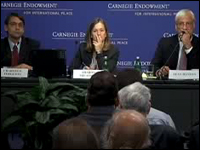Registration
You will receive an email confirming your registration.
Carnegie scholar Sharon Squassoni was joined by Charles Ferguson of the Council on Foreign Relations, Alex Hanson of AREVA in a discussion about the feasibility and desirability of a nuclear renaissance.
Sharon Squassoni stated that without significant political and financial support, nuclear energy is expected to decline in its share of electricity generation by 2030. The drivers for that support seem to be nuclear energy's contributions to energy security and climate change. Yet nuclear energy won't reduce American dependence on foreign oil, which has been a key concern of many Americans. And it will likely take decades to double the number of nuclear power reactors, even though that added capacity would provide less than 10 percent of needed carbon reductions. Given the added risks of cost, waste, safety and proliferation, the emphasis on nuclear energy as an answer to energy security and climate change is misplaced. Nonetheless, some nuclear expansion is likely to go forward.
To reduce risks of a potential expansion, the next administration should take steps, among others, to level the energy playing field, adopt the IAEA's Additional Protocol as a standard of nuclear supply, and de-emphasize the national prestige associated with both nuclear cooperation and sensitive nuclear technologies like uranium enrichment. One approach to devaluing the prestige associated with national enrichment facilities would be to ban such national plants under a fissile material production cutoff treaty.
Alan Hanson argued that while nuclear energy is not the answer, it needs to be part of the answer. Although nuclear energy cannot solve climate change, existing nuclear power plants now produce electricity without any C02 emissions. Hanson highlighted the safety and security steps necessary for nuclear energy’s expansion. In particular, he suggested that exporting regulatory structures and practices would be a good step in the right direction. The Build-Own-Operate model could also help mitigate some risks. Finally, proliferation should be firmly established as a political problem requiring political, not technical, arrangements. Hanson supported the notion of internationalizing fuel cycle facilities and suggested that the industry was already moving in this direction, but that it should not be forced upon the industry from governments.
Charles Ferguson presented an overview of the two U.S. presidential candidates' positions on nuclear energy. Senator McCain has been much more specific in his goals – 45 new reactors by 2030 and eventually 100 – while Senator Obama has stressed the need to address security, waste and proliferation, while stating that nuclear energy will be part of overall climate change solutions.
During the question and answer session, participants inquired about the feasibility of multinational control of enrichment facilities. Squassoni noted that a few enrichment corporations are already multinational and Hanson added that commercial interests will push the industry even more in this direction. A second set of questions asked about the global shortage of nuclear expertise and workers. Hanson responded that civilian and mechanical engineers are needed most, but that this should be manageable. Although close to 35 percent of current workers will retire in the next 10 years, there are programs underway to increase interest in the nuclear sector.
